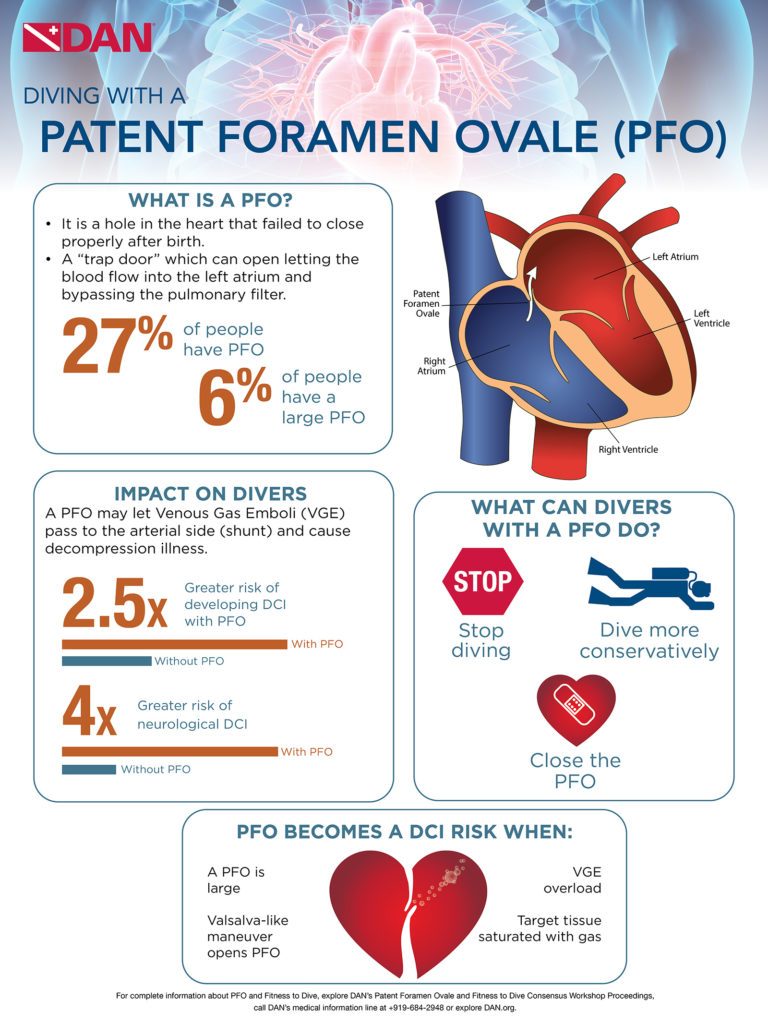A patent foramen ovale (PFO), or a “hole in the heart,” is a known risk factor for decompression sickness (DCS). This study sought to determine if closing this hole in a surgical procedure would decrease the risk of DCS and compared these findings to divers that were advised to dive more conservative profiles. Results corroborated current guidelines outside of the standardized research environment.
This experimental study was completed in 2019.
A patent foramen ovale (PFO), a common congenital heart defect, is a hole between the right and left sides of the heart. For nearly 40 years, it has been suspected that inert gas bubbles can travel through this hole and cause decompression sickness (DCS).
In the beginning, there were two options for scuba divers with PFOs seeking to reduce their DCS risk: to stop diving or to dive more conservatively, such as conducting shallower profiles or diving nitrox on air tables. Recently, interventional cardiologists have begun to offer PFO closure as a third DCS risk mitigation strategy. Scientists have shown this procedure to be effective in reducing DCS risk in hyperbaric chamber studies and in standardized research environments, but its efficiency in the “real world” has not yet been established. Divers with PFOs needed to know how effective PFO closure was in reducing DCS risk outside of a highly regulated hospital. The goal of the DAN PFO study was to determine this information.
The study followed 23 divers with PFOs who dove conservatively and 42 divers with PFOs who got PFO closure for up to six years. It examined if their decision to dive conservatively or get PFO closure reduced their incidence of DCS.
Results showed that PFO closure reduced the incidence of DCS. Conservative diving’s effect was inconclusive, most likely due to a small sample size. Since surgical procedures are not without risk, a subset of divers was identified that would benefit most and should consider this procedure. These were healthy divers with large PFOs, previous histories of serious DCS and strong desires to pursue advanced diving.

Additional Reading and References
Articles
- Study Update: PFO
- Divers With Holes in Their Hearts
- PFO and Decompression Illness in Recreational Divers
Publications
- You can download the following related workshop proceedings in the DAN Publication Library:
- 2015 Patent Foramen Ovale and Fitness to Dive
- Guidelines for Patent Foramen Ovale and Fitness to Dive
- Pollock NW. Patent foramen ovale: background and impact on divers. dirQuest. 2002; 3(1):15-18.
Peer-Reviewed Publications
- Anderson G, Ebersole D, Covington D, Denoble J. The effectiveness of risk mitigation interventions in divers with persistent (patent) foramen ovale. Diving and Hyperb Med. 2019 June; 49(2):80-87.
- Cotton JB, Ebersole DG, Pollock NW, Denoble PJ. History of diving and decompression sickness in scuba divers tested for patent foramen ovale and pursuing closure. Undersea Hyperb Med. 2011; 38(5):466.